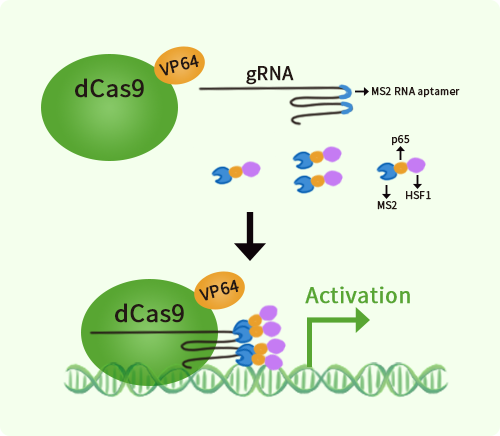Human LIFR activation kit by CRISPRa
CAT#: GA102693
LIFR CRISPRa kit - CRISPR gene activation of human LIF receptor subunit alpha
CNY 12,255.00
Specifications
| Product Data | |
| Format | 3 gRNAs (5ug each), 1 scramble ctrl (10ug) and 1 enhancer vector (10ug) |
| Symbol | LIFR |
| Locus ID | 3977 |
| Kit Components | GA102693G1, LIFR gRNA vector 1 in pCas-Guide-GFP-CRISPRa GA102693G2, LIFR gRNA vector 2 in pCas-Guide-GFP-CRISPRa GA102693G3, LIFR gRNA vector 3 in pCas-Guide-GFP-CRISPRa 1 CRISPRa-Enhancer vector, SKU GE100056 1 CRISPRa scramble vector, SKU GE100077 |
| Disclaimer | These products are manufactured and supplied by OriGene under license from ERS. The kit is designed based on the best knowledge of CRISPRa SAM technology. The efficiency of the activation can be affected by many factors, including nucleosome occupancy status, chromatin structure and the gene expression level of the target, etc. |
| Reference Data | |
| RefSeq | NM_001127671, NM_002310, NM_001364297, NM_001364298 |
| Synonyms | CD118; LIF-R; SJS2; STWS; SWS |
| Summary | This gene encodes a protein that belongs to the type I cytokine receptor family. This protein combines with a high-affinity converter subunit, gp130, to form a receptor complex that mediates the action of the leukemia inhibitory factor, a polyfunctional cytokine that is involved in cellular differentiation, proliferation and survival in the adult and the embryo. Mutations in this gene cause Schwartz-Jampel syndrome type 2, a disease belonging to the group of the bent-bone dysplasias. A translocation that involves the promoter of this gene, t(5;8)(p13;q12) with the pleiomorphic adenoma gene 1, is associated with salivary gland pleiomorphic adenoma, a common type of benign epithelial tumor of the salivary gland. Multiple splice variants encoding two different isoforms have been found for this gene. [provided by RefSeq, Jun 2018] |
Documents
Resources
| 基因表达相关资源 |
Other Versions
| SKU | Description | Size | Price |
|---|---|---|---|
| KN420696 | LIFR - KN2.0, Human gene knockout kit via CRISPR, non-homology mediated. |
CNY 8,680.00 |


 United States
United States
 Germany
Germany
 Japan
Japan
 United Kingdom
United Kingdom
 China
China

